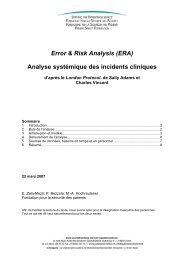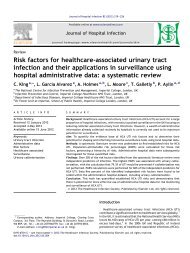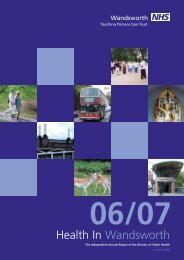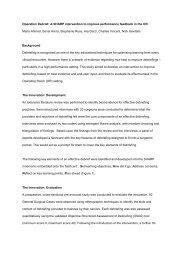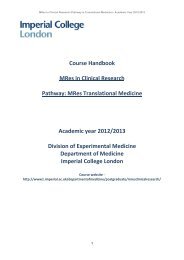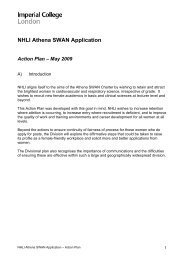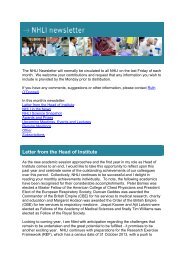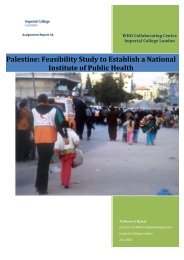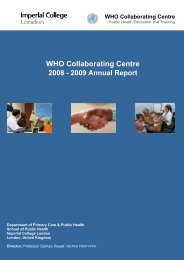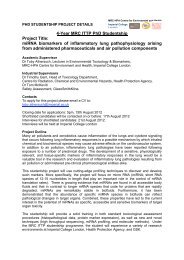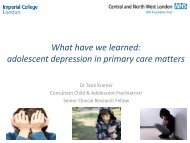Degree of perceived professional consensusThe RCGP supports inclusion of alcohol misuse in the <strong>QOF</strong> and regards a selective screeningapproach to adult patients in routine care as realistic for clinicians.A consultation with local stakeholders, including representatives from primary care and publichealth, showed overall consensus for the scientific soundness, importance and feasibility of theseindicators in <strong>QOF</strong>+.Degree of perceived support from patients and carersThere is evidence that patients are supportive of advice on alcohol-related issues (Hutchings etal., 2006).Impact on health inequalitiesThe Independent Inquiry into Inequalities in Health (Acheson, 1998) concluded that:“Deaths from diseases caused by alcohol show a clear gradient with socio-economicposition, with an almost fourfold higher rate in unskilled working men compared to thosefrom professional groups. In addition, alcohol is a contributory factor to deaths fromaccidents, which also show a pronounced socio-economic gradient.”Disadvantaged communities have higher levels of alcohol-related mortality, hospital admission,crime, absence from work, school exclusions, teenage pregnancy and road traffic accidentsassociated with greater levels of alcohol consumption. Within localities, the most disadvantagedindividuals have four to fifteen times greater alcohol-specific mortality and four to ten timesgreater alcohol-specific admission to hospital than the most affluent (North West Public HealthObservatory, 2007, Department of Health, 2008).Health impactEvidence by Wallace et al. (1988) suggests that the consistent implementation of simple alcoholadvice, across the UK, would result in the reduction from hazardous and harmful to low-riskdrinking levels in 250,000 men and 67,500 women each year.There is some limited evidence from a meta-analysis that brief interventions reduce alcoholrelatedmortality (Cuijpers, Riper and Lemmens, 2004).30
Workload and training implicationsResearch by Kaner et al. (1999b) identified a number of barriers to implementation of briefintervention in primary care. These include lack of time, lack of training, a belief that patients willnot take advice to change drinking behaviour, a lack of suitable screening and counsellingmaterials, lack of reimbursement from government health schemes, negative attitudes towardspatients with drinking problems and fear of offending patients by raising the topic of drinking.In their review of the effectiveness of treatment for alcohol problems, Raistrick et al. (2006)describe ways in which many of these barriers can be easily overcome, such as providingappropriate training in screening and brief interventions for alcohol misuse, but acknowledgethat “the most difficult obstacles are those to do with lack of time and of reimbursement for thiswork”.Incorporation into <strong>QOF</strong>+ of indicators relating to screening and brief intervention for alcoholmisuse in primary care could help address the issue of reimbursement. With respect to training, itis proposed that this will take place through an e-module offered by the Department of Health(due to launch in November 2008) and will be supplemented by training to individual practicesdelivered by the Hammersmith and Fulham Drug and Alcohol Team. For details of the proposed training package see section 14.3.2 (p92).ReferencesAcheson D (1998) Inequalities in health: report of an independent inquiry. <strong>London</strong>: HMSOAertgeerts B, Buntix F, Ansoms S & Fevery J (2001) Screening properties of questionnaires andlaboratory tests for the detection of alcohol abuse or dependence in a general practice population.British Journal o0f General Practice 51:206-217Babor TF, Ritson EB & Hodgson RJ (1986). Alcohol-related problems in the primary health care setting:A review of early intervention strategies. British Journal of Addiction 81:23–46Bush K, Kivlahan DR, McDonell MB, Fihn SD, Bradley KA (1998). The AUDIT alcohol consumptionquestions (AUDIT-C): An effective brief screening test for problem drinking. Archives of InternalMedicine 158:1789–1795Carpenter A and Mayers A (2006) Hammersmith and Fulham PCT Public Health Report 2006.Cuijpers P, Riper H, Lemmens L (2004). The effects on mortality of brief interventions for problemdrinking: A meta-analysis. Addiction 99:839–845Darzi A (2008) High Quality Care for All, the final report of the NHS Next Stage Review Final Report byLord Darzi The Stationary Office. <strong>London</strong>Department of Health (2008) Health inequalities: progress and next steps. <strong>London</strong>: Department ofHealthDepartment of Health, Home Office, Department for Education and Skills, Department for Culture,Media and Sport (2007) Safe. Sensible. Social. The next steps in the national alcohol strategyDrummond C, Oyefeso A, Phillips T, Cheeta S, Deluca P, Perryman K, et al. (2004) Alcohol needsassessment research project (ANARP): the 2004 national alcohol needs assessment for England.<strong>London</strong>: Department of Health31



